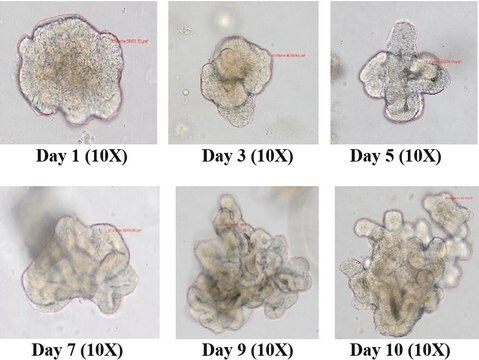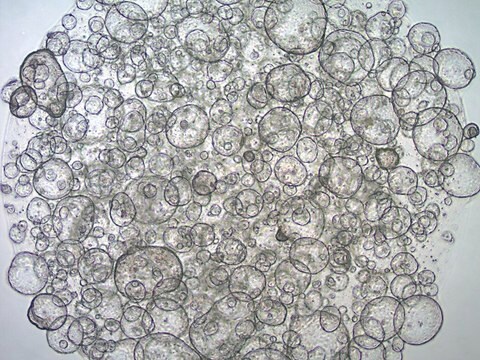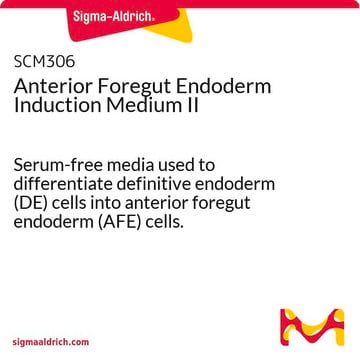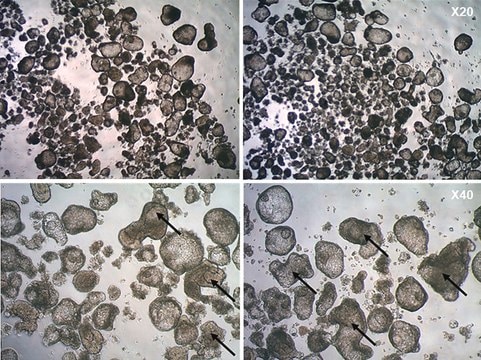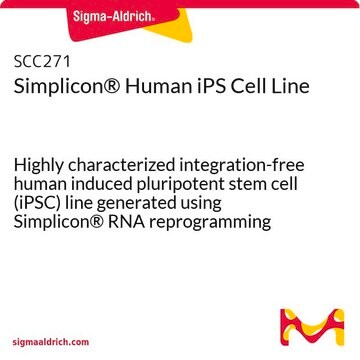SCC300
3dGRO® Human iPSC Derived Colon Organoids
Synonim(y):
Human Colon Organoids, Human Colonoids, Human Gut Organoids, Human Intestinal Organoids
About This Item
Polecane produkty
Postać
liquid
metody
cell culture | stem cell: suitable
Zastosowanie
cell analysis
Opis ogólny
3dGRO® Human iPSC Derived Colon Organoids are derived from integration-free human iPS cells (Cat. No. SCC271) reprogrammed using the Simplicon RNA reprogramming technology (Cat. No. SCR550). Human iPS cells were differentiated using a multi-step process from definitive endoderm to posterior hind-gut endoderm and eventually into colon organoids (Figure 1.). The organoids express colon-specific markers including the posterior hindgut marker CDX2, a-carbonic anydrase II (CA-II), a-carbonic anhydrase IV (CA-IV), and goblet cell markers Mucin-2 and Mucin-5B. 3dGRO® human iPSC derived colon organoids can be propagated long-term by passaging every 10-12 days using 3dGRO® Human Colon Organoid Expansion Medium (Cat. No. SCM304).
Zastosowanie
Research Category:
- Cell Culture
- Stem Cell Research
Jakość
- Each vial contains ≥1500 organoids.
- Mycoplasma: Negative
- Genotyped by STR analysis: Pass
- Human species verified
- Organoids are negative for HPV-16, HPV-18, Hepatitis A, B, C, and HIV-1 & 2 viruses by PCR.
- Cell viability test: Pass
Przechowywanie i stabilność
Informacje prawne
Oświadczenie o zrzeczeniu się odpowiedzialności
Kod klasy składowania
12 - Non Combustible Liquids
Klasa zagrożenia wodnego (WGK)
WGK 1
Temperatura zapłonu (°F)
does not flash
Temperatura zapłonu (°C)
does not flash
Certyfikaty analizy (CoA)
Poszukaj Certyfikaty analizy (CoA), wpisując numer partii/serii produktów. Numery serii i partii można znaleźć na etykiecie produktu po słowach „seria” lub „partia”.
Masz już ten produkt?
Dokumenty związane z niedawno zakupionymi produktami zostały zamieszczone w Bibliotece dokumentów.
Produkty
Human epithelial intestinal colonic organoids can be used as an alternative to Caco-2 drug permeability assays for drug screening and compound toxicity testing.
Organoid culture FAQs. Learn how to culture and analyze organoids following established 3D cell culture protocols. Tips and tricks.
Najczęściej zadawane pytania dotyczące hodowli organoidów. Dowiedz się, jak hodować i analizować organoidy zgodnie z ustalonymi protokołami hodowli komórek 3D. Wskazówki i porady.
Protokoły
Highly characterized cryopreserved human colonic organoids and a step-by-step organoid culture protocol for epithelial intestinal organoid differentiation from iPS cells.
Learn how to cultivate similar-sized iPSC-derived colon organoids using Millicell® Microwell plates and perform a forskolin-induced swelling assay.
Powiązane treści
Our broad range of the most trusted tools for cell culture includes stringently sourced and tested FBS, established media formulations, and sterile labware. Cutting-edge techniques using stem cells and 3D matrices are enabled by organoids, hydrogels, culture scaffolds, and bioinks for 3D bioprinting.
Monitor barrier formation using colon PDOs, iPSC-derived colon organoids, Millicell® cell culture inserts, and the Millicell® ERS. 3.0.
Zapoznaj się z naszą ofertą narzędzi i technologii do hodowli komórek 3D dla dowolnej linii komórek 3D lub zastosowania i odkryj organoidy, hydrożele, ULA, mikrodołki lub płytki hydrożelowe i nie tylko.
Explore our portfolio of 3D cell culture tools and technologies for any 3D cell line or application and discover organoids, hydrogels, ULA, microwell, or hydrogel plates, and more.
Nasz zespół naukowców ma doświadczenie we wszystkich obszarach badań, w tym w naukach przyrodniczych, materiałoznawstwie, syntezie chemicznej, chromatografii, analityce i wielu innych dziedzinach.
Skontaktuj się z zespołem ds. pomocy technicznej